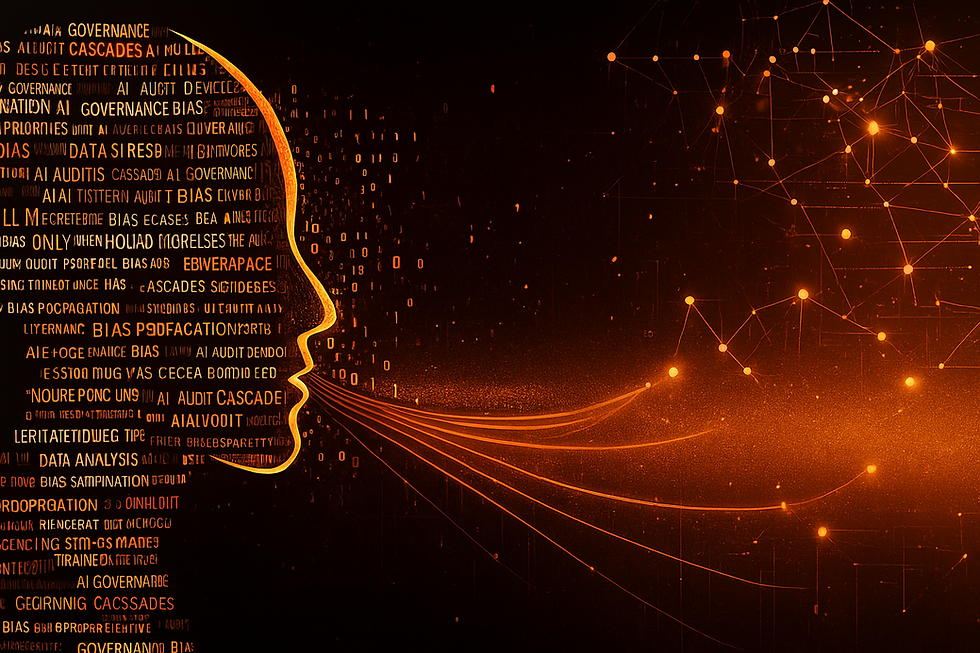The Role of Ethical Frameworks in Navigating the Future of AI: Driving Sustainable Development
- Dale Rutherford

- Sep 13, 2024
- 4 min read
Updated: 7 days ago

Artificial Intelligence (AI) has rapidly become a transformative force in various sectors, revolutionizing industries and reshaping the future of innovation. While AI has already proven its potential in optimizing processes, decision-making, and resource management, its deployment in the context of sustainable development remains fraught with ethical concerns. As we look toward an unknown future, the role of an ethical framework becomes increasingly important in guiding the responsible use of AI to ensure that development is inclusive, equitable, and sustainable.
In this post, we explore the intersection of AI and sustainable development, its ethical challenges, and the importance of establishing a robust ethical framework to navigate the complexities ahead.
Understanding the Intersection of AI and Sustainable Development
As defined by the United Nations, sustainable development is centered on achieving three main objectives: economic growth, social inclusivity, and environmental sustainability. In this era of rapid digitalization, AI holds immense potential to contribute to these objectives by improving resource use efficiency, enhancing decision-making through predictive analytics, and fostering innovation that can help address global challenges such as climate change, poverty, and inequality.
For instance, AI can optimize supply chain processes, reduce waste in manufacturing, and enable precision agriculture, which can significantly minimize environmental impact. In healthcare, AI can improve patient outcomes through personalized treatment plans, thus promoting social inclusivity by providing equitable access to advanced medical technologies. However, while the promises are vast, the deployment of AI must be carefully regulated and guided by ethical principles to avoid exacerbating existing inequalities and causing harm.
Ethical Considerations in AI for Sustainable Development
Transparency and Accountability
In the context of sustainable development, transparency in AI is essential for building trust and ensuring that stakeholders can scrutinize AI-driven decisions. AI systems, especially those that operate in critical areas like environmental protection, healthcare, and public policy, must be transparent in their design and operation. This requires clear documentation of algorithms' training, the data sources, and the rationale behind their decisions.
Accountability mechanisms must also be established to hold developers and organizations responsible for the outcomes of AI applications. A lack of accountability can lead to decisions that perpetuate harm or inequality, especially if AI systems make decisions that affect marginalized communities or environmentally sensitive regions. By ensuring transparency and accountability, stakeholders can better evaluate AI's long-term societal and environmental impacts.
Fairness and Bias Mitigation
One of AI's most pressing ethical challenges is the risk of bias, which can manifest in various forms, such as biased training data, unequal access to AI benefits, or algorithmic discrimination. Addressing bias is critical to ensuring that AI-driven solutions promote fairness and inclusivity in the context of sustainable development. For example, biased data in an AI system deployed to manage resource distribution could result in certain regions or populations being unfairly excluded from receiving vital resources. Similarly, AI models used in environmental monitoring must avoid bias that could lead to neglecting vulnerable ecosystems. Ethical AI frameworks should prioritize bias mitigation strategies, such as diverse data collection, inclusive algorithm design, and rigorous testing for fairness across different demographics.
By embedding fairness and inclusivity into AI systems, we can ensure that the benefits of sustainable development are distributed equitably, particularly in underserved communities that stand to gain the most from such innovations.
Privacy and Data Security
The ethical use of AI for sustainable development also demands careful attention to privacy and data security. AI's reliance on vast amounts of data raises concerns about the potential misuse or overreach of personal information, particularly in contexts involving sensitive data, such as health, education, or social welfare.
Balancing the need for large-scale data collection with the right to privacy is a delicate but necessary task. Ethical AI frameworks must include provisions for safeguarding personal data, ensuring that individuals retain control over their information and that their privacy rights are respected. This is especially important when AI systems are deployed for societal good, as the public must trust that their data will not be exploited or compromised.
Moreover, robust data governance protocols must be in place to secure data integrity and prevent breaches that could have wide-reaching consequences. In a world where AI continues to evolve, data governance professionals must be in charge of developing these ethical safeguards.
The Path Forward: Embracing an Ethical AI Framework for Sustainable Development
To effectively harness AI for sustainable development, stakeholders must commit to an ethical AI framework that addresses the unique challenges of an unknown future. Such a framework should include the following pillars:
Transparency: Ensuring that AI systems are transparent in how they function and how decisions are made, with clear documentation and explainability at the forefront.
Fairness and Inclusivity: Mitigating biases and promoting the fair distribution of AI benefits across diverse populations and geographies, particularly in vulnerable and marginalized communities.
Accountability: Establish clear lines of accountability for AI systems' outcomes, especially in high-impact areas like environmental protection and public health.
Privacy and Security: Protecting individuals’ data and ensuring robust security measures are in place to safeguard sensitive information.
The unknown future of AI offers immense possibilities, but without an ethical framework, we risk creating technologies that could exacerbate inequality, harm the environment, or undermine social cohesion. It is crucial that the development and deployment of AI prioritize human rights, sustainability, and inclusivity.
Conclusion
As AI continues to evolve, its potential to drive sustainable development is both exciting and uncertain. By embedding ethical principles into the core of AI systems, we can ensure that technology serves as a force for good—enhancing economic, social, and environmental well-being without compromising ethical standards.
Academics, data professionals, and policymakers must collaborate to create an ethical AI framework that meets today's challenges and anticipates the complexities of the future. By fostering transparency, accountability, fairness, and privacy, we can shape a future where AI helps to build a more sustainable and inclusive world.
The future is unknown, but with a strong ethical foundation, we can confidently navigate the intersection of AI and sustainable development, ensuring that progress benefits all and sustains our planet for future generations.




Comments